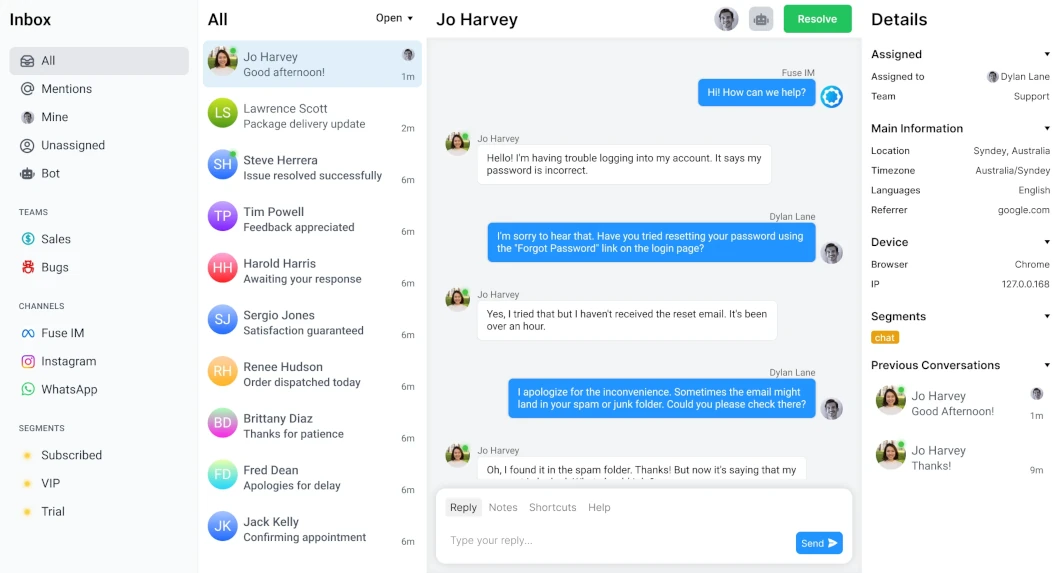If you’ve set up a new business, perhaps with limited financial resources and manpower, you might not consider customer relationship management (CRM) to be one of your immediate priorities. After all, there’s so much to do to get the company off the ground. You’ve got to think about product and service development, finance, administration, as well as sales and marketing. And if you’re working with a single pair of hands, this can be a fairly daunting prospect.
But it’s important to recognize the value that CRM can add to businesses of all sizes, including start-ups that are trying to get themselves established. These tools can play an important role in your business growth from the outset. In the digital age, when companies can reach out to customers across the globe - not just in their immediate geographical proximity - there is plenty to be gained through effective targeted marketing. There’s a world out there full of sales opportunities, even for the smallest enterprise.
Benefits of Using a CRM for Startups
All businesses, whether they are large companies or small startups, need to have some system in place to manage their customer interactions. This is where customer relationship management (CRM) software comes in. CRM software helps businesses to keep track of their customers, know what they want and need, and improve customer relationships.
There are many benefits of using a CRM for startups:
#1 Time-Saving and Streamlined Operations
- A CRM system centralizes all customer information, making it easier to manage and access. This consolidation saves time and streamlines business operations.
- Automation of routine tasks like email marketing and follow-ups is another key benefit. This frees up more time to focus on broader business goals rather than on individual customer interactions.
#2 Enhanced Customer Relationships
- CRM software offers deeper insights into customer preferences and needs. This understanding allows for more tailored services or products.
- By providing what customers need when they need it, a CRM can foster repeat business and build stronger customer loyalty.
#3 Overall Benefits for Startups
- For startups, adopting a CRM system can be incredibly beneficial.
- The system not only saves time and enhances customer relationships but also contributes significantly to the growth and success of the business.
If you are a startup business owner, it is definitely worth considering using a CRM system.
Top 8 CRM Solutions for Startups in 2024
| Software | Reviews | Free Trial | Best For |
|---|---|---|---|
| Fuse IM | - | - | |
| Attio | - | - | |
| HubSpot | - | - | |
| Streak | - | - | |
| Salesflare | - | - | |
| Zoho | - | - | |
| Freshworks | - | - | |
| Pipedrive | - | - | |
| Salesforce | - | - |
1. Fuse IM
One of the most important aspects of running a successful startup is having a good customer relationship management (CRM) system in place. A CRM system helps you keep track of your customers, their contact information, and their interactions with your company. It can also help you manage your sales pipeline and keep track of important tasks and deadlines.
There are a lot of different CRM tools on the market, but one that we particularly like for startups is Fuse IM. Fuse IM is a cloud-based CRM tool that is very affordable and easy to use. It has all of the features you need to get started with managing your customers and your sales, and it is constantly being updated with new features.
One of the best things about Fuse IM is that it integrates with a lot of other business tools that you might be using, such as Gmail, Google Calendar, and Dropbox. This makes it easy to keep all of your customer information in one place and makes it easy to access from anywhere.
If you are looking for a CRM tool for your startup, we highly recommend checking out Fuse IM. It is a great tool that will help you stay organized and keep track of your customers.
2. Attio
As a startup, you're always looking for ways to get ahead of the competition. Attio is a great CRM tool that can help you do just that. With its powerful features and easy-to-use interface, Attio is the perfect tool for startups looking to get a leg up on their competition.
Some of Attio's key features include:
- Lead capture and management: Attio makes it easy to capture and manage leads. With its powerful lead management tools, you can quickly and easily stay on top of your leads.
- Contact management: Attio's contact management tools make it easy to keep track of your contacts. With its easy-to-use interface, you can quickly and easily add, edit, and delete contacts.
- Task management: Attio's task management tools make it easy to stay on top of your to-do list. With its easy-to-use interface, you can quickly and easily add, edit, and delete tasks.
- Pipeline management: Attio's pipeline management tools make it easy to keep track of your sales pipeline. With its easy-to-use interface, you can quickly and easily add, edit, and delete pipeline stages.
- Reporting: Attio's reporting tools make it easy to track your progress. With its easy-to-use interface, you can quickly and easily generate reports on your leads, contacts, tasks, and pipeline.
3. HubSpot
HubSpot is a CRM tool that is specifically designed for startups. It offers a free version for small businesses, and a paid version for larger businesses. HubSpot is a cloud-based CRM, which means it can be accessed from anywhere, and it offers a wide range of features, including:
Key Features
- Contact management
- Lead capture
- Lead nurturing
- Email marketing
- Reporting and analytics
- Sales automation
- Integrations with other software
How much does HubSpot cost?
HubSpot offers a free version for small businesses, and a paid version for larger businesses. The paid plans start at $50 per month, and they offer a discount if you pay annually.
4. Streak
Streak is a CRM tool designed specifically for startups, so it's easy to use and has all the features you need to get started. Plus, it's free!
Streak has a simple interface that makes it easy to add and manage your customer contacts. You can also keep track of your interactions with each customer, so you always know where you're at in the relationship.
Streak also has some great features for managing your sales pipeline. You can easily see which customers are interested in your product and keep track of where they are in the buying process. This helps you close more deals and grow your business.
5. Salesflare
Salesflare is one of the most popular CRM tools for startups. It is a cloud-based CRM software that helps sales teams to manage their customers and deals. It has a simple and easy-to-use interface that makes it ideal for small businesses. It offers features such as lead capture, contact management, deal management, and sales automation.
6. Zoho
Zoho is affordable, flexible, and easy to use.
With Zoho, you only pay for the features you need. There's no long-term contract, so you can scale up or down as your business changes. And so you'll be up and running quickly.
Zoho has all the features you need to manage your customers and grow your business. You can track your sales, automate your marketing, and provide great customer service.
Plus, Zoho integrates with over 500 other apps, so you can add on features as you need them.
7. Freshworks
Freshworks CRM is a cloud-based CRM solution that offers a Forever Free plan for startups with up to 10 users. Some of the key features of Freshworks CRM include contact management, lead capture, deal tracking, and built-in phone calls. The software also integrates with popular business tools, such as Gmail, Slack, and Zapier.
8. Pipedrive
Pipedrive is a cloud-based CRM solution that’s designed to help sales teams close more deals. The software offers a 14-day free trial and a pay-as-you-go pricing model that’s tailored for startups. With Pipedrive, startups can get access to features like contact management, deal pipeline management, sales automation, and email integration.
9. Salesforce
Salesforce is a cloud-based CRM software that gives startups the tools they need to manage their customer relationships. It includes features like lead management, contact management, opportunity management, and pipeline management. All of these features are designed to help startups close more deals and grow their business.
Salesforce is also very affordable for startups. Its prices start at just $25 per month, which is much cheaper than other CRM software options on the market. Plus, Salesforce offers a free trial so startups can try it before they buy it.
What features to Consider When Choosing A CRM
There are a lot of CRM tools on the market these days. How do you know which one is right for your startup? Here are some things to consider when choosing a CRM:
- Ease of use. The last thing you want is a complicated CRM that takes forever to learn. Look for something that is user-friendly and easy to set up.
- affordability. Startups are usually on a tight budget, so you'll want to find a CRM that is affordable. There are a lot of great options out there that won't break the bank.
- features. When considering features, think about what you need the CRM to do for you. For example, if you need to track sales and customer interactions, look for a CRM that has those features. If you need to do more advanced things like marketing automation, look for a CRM that has those features as well.
- integration. One of the most important things to consider is whether or not the CRM will integrate with the other tools you are using. This is important because you want your data to be accessible in one place.
- support. When you are using a CRM, you will inevitably have questions or need help from time to time. Make sure the CRM you choose has good customer support so you can get the help you need when you need it.
These are just a few things to consider when choosing a CRM for your startup. Take your time and find the one that is right for you and your business.
Put your business on the right path with Fuse IM
As a startup, you have a lot on your plate. You're trying to get your business off the ground, and you don't have a lot of time or money to spare. That's why it's so important to choose the right CRM for your business. With Fuse IM, you'll be able to put your business on the right path from the start.
Fuse IM is the best CRM for startups because it's affordable, easy to use, and it has all the features you need to get your business up and running. With Fuse IM, you'll be able to track your sales, manage your contacts, and automate your marketing. Plus, you'll be able to do all of this from one easy-to-use platform.
So if you're looking for a CRM that will help you get your business on the right track, then look no further than Fuse IM. With Fuse IM, you'll have everything you need to succeed.


